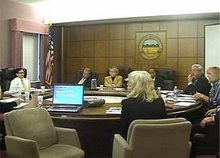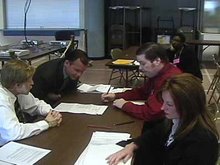If I read this correctly, it seems that such investigations can be undertaken and implemented even without any normally-assumed, citizen-protective, judicial intervention or protocol (except for any legal counsel that a charged citizen, or one not-charged but only thought to have "pertinent information," needs to acquire on one's own.) And the investigations themselves can be kept and reported only between the boards and the SoS.
My first impression upon reading Advisory 08-10 includes:
• Why would anyone hand a board of elections (!) such extreme "quasi-judicial" "rights and duties" with no other normally assumed, protective judicial protocols required? A non-over-sighted, politically and partisanly-driven board of elections !? - sitting there often by political machinations/appointments, at times by SoS (this link just one example,)- with an acknowledged competence level that even had in the SoS June 4 Memorandum (about submitting meeting minutes to the SoS office,) the proviso that if they didn't know how to send an email attachment, they should call the SoS office to be walked through the process? (Does that give you confidence in these people in charge to usually stay all alone determining who wins and loses our electronically determined elections? (even with paper ballots.)
Apparently at some point the OH legislature already did already hand boards of elections those powers.
But then-
• Why would any Secretary of State, especially a former judge, seemingly out of the blue, feel the need to remind those boards of elections of those "rights and duties" without also reminding them of their extreme nature, thus to use them only with greatest judiciousness, and with proper protection of the presumed innocence of citizens/voters/candidates, and in only the most extremely, provable circumstances.
• What was this seeming "out of the blue" timing really about? - for it seems in the elections and political arenas, nothing that seems accidental ever is. Is it related to Cliff Arnebeck's, a Columbus attorney's recently lifting of the stay on his '04 election case; said to be an effort to protect the integrity of the 'o8 election, and now citing allegations, and evidence of massive fraud by a number of GOP operatives in '04?
Or is it related to something else?
• While there remain so many other important matters to help boards get properly and competently ready for a citizen-successsful, fair election in fast approaching November, and without knowing what incited Advisory 08-10 to appear without even necessary reminders about protections for average citizens against even possibly partisanly driven, and/or possibly trumped up charges to get rid of inquiring activists, or even to let voters know who's really the bosses of their elections, such reminder appears chillingly a move of joint insider control, rather than help toward election justice.
• And since the SoS is the only oversight of the boards of elections, which at times appears quite arbitrary according to who and what goes along with her wishes, and sends in no equitable monitoring/feedback mechanism - for instance just believing whatever boards write in their minutes about what they've done or have not. (Attend a CCBOE meeting, then check the minutes and see if you think they are an adequate representation for one who was not there.) And for another small example, see -http://citizensboe.blogspot.com/2008/06/march-audit-part-1.html) about the "audit" of the March election. (There were no written waivers from the SoS about Cuyahoga not following Directive 08-39, (her Audit Directive, with "the force of law";) even confusion on the part of some Cuyahoga staff knowing whether or not the Directive was being followed; and the last film in that post shows that even when the SoS field rep was present, and asked about their not following the Directive, he "had no say" about what Cuyahoga did and did not do.)
The ultimate question has to remain, who does and can truly monitor the Secretary of State's actions for equal citizen and voter protection and equal justice?
ADVISORY NO. 2008-10I personally have witnessed the former Cuyahoga board subpoena an activist; threaten to take action against another activist for filing "too many" public information requests with a self-"manufactured" list, when the board staff had answered no requests - for months, but kept requesting repeated requests, so they "could get to them." Also this board for example, talked about subpoenaing voters who were not informed by poll workers that they were in the wrong precinct and were allowed to sign in before getting the information, but not to vote, then after being sent to the correct precinct, signed in again as required, then later being suspected (and with possible subpoena) of trying to vote twice. For the board to glean their information in such investigations, they merely have staff phone the poll workers who seemingly inevitably claim they did everything right. But they, all intelligent lawyers in this case, still seem willing to, oppositely, consider subpoenaing voters and putting them under oath for public testimony in front of the board.
July 18,2008
To: All County Boards of Elections Members, Directors and Deputy Directors
Re: Reporting Facts of Investigations under R.C. 3501.11(J); Issuing and Serving Subpoenas
Report of Investigation Facts
Under R.C. 3501.11(J), each county board of elections is vested with the authority and the duty to investigate irregularities, nonperformance of duties, and other violations of Title XXXV of the Ohio Revised Code by election officers and other persons. Last year, Amended Substitute House Bill No. 119 amended this statute to provide a board of elections the option of reporting the facts adduced in an investigation conducted pursuant to R.C. 3501.11(J) to the secretary of state, instead of the county prosecutor.
A county board of elections that chooses to report the facts of its investigation to the secretary of state shall do so in writing. The report should provide a historical summary of the matter and a list of the board's factual findings. The board may attach relevant exhibits or other documents to its report. If a board opts to report facts of its investigation to the secretary of state rather than the county prosecutor, the report and any attachments must be submitted to the secretary of state's director of elections. However, as a general rule, a board is also encouraged to report the facts of an investigation to its county prosecutor
Issuing and Serving Subpoenas
R.C. 3501.11(J) provides that a board of elections shall "administer oaths, issue subpoenas,
summon witnesses, and compel the production of books, papers, records, and other evidence in connection with any such investigation." However, nothing in Ohio's election laws prescribes either the form of the subpoena or a procedure for serving subpoenas.
As ubpoena is more than a mere notice to appear before the board. A subpoena carries with it the weight of aw, commanding the appearance of a person and/or compelling the production of documents. Failure to obey a subpoena carries the potential of criminal sanctions. Therefore, it is important that a subpoena sufficiently identify the person and/or documents to be produced. It is also important that appropriate procedures are followed to ensure the timely delivery of a subpoena \vith adequate notice of the board proceeding.
Absent a statute that expressly provides otherwise, subpoenas issued in connection with noncriminal proceedings are governed generally by the Rule 45 of the Rules of Civil Procedure (cited as "Civ. R. 45"). It is, and has been, the position of the secretary of state's office that a subpoena issued by a board of elections acting in its capacity as a quasi-judicial body must satisfy the provisions of Civ. R. 45(A), as follows:
(A) Form; issuance; notice
(1) Every subpoena shall do all of the following:
(a) state the name of the [board of elections, when it is acting in a quasijudicial
capacity] from which it is issued, the title ofthe action, and the case
number;
(b) command each person to whom it is directed, at a time and place specified
in the subpoena, to:
(i) attend and give testimony at a trial, hearing, or deposition;
(ii) produce documents or tangible things at a trial, hearing, or deposition;
(iii) produce and permit inspection and copying of any designated
documents that are in the possession, custody, or control of the person;
(iv) produce and permit inspection and copying, testing, or sampling of any
tangible things that are in the possession, custody, or control of the person;
or
(v) permit entry upon designated land or other property that is in the
possession or control of the person for the purposes described in Civ. R.
34(A)(3)·
(c) set forth the text of divisions (C) and (D) ofthis rule.
Acommand to produce and permit inspection may be joined with a command to attend and give testimony, or may be issued separately.
Asubpoena may not be used to obtain the attendance of a party or the
production of documents by a party in discovery. Rather, a party's attendance at a deposition may be obtained only by notice under Civ. R. 30, and documents may be obtained from a party in discovery only pursuant to Civ. R. 34.
(2) The clerk [in the case of the board of elections, the director and deputy
director jointly] shall issue a subpoena, signed, but otherwise in blank, to a party requesting it, who shall complete it before service. An attorney who has filed an appearance on behalf of a party in an action may also sign and issue a subpoenaon behalf of the [the board of elections, when it is acting in a quasi-judicial capacity] in which the action is pending.
(3) A party on whose behalf a subpoena is issued under division (A)(l)(b)(ii), (iii), (iv), or (v) of this rule shall serve prompt written notice, including a copy of the subpoena, on all other parties as provided in Civ. R. 5. If the issuing attorney modifies a subpoena issued under division (A)(l)(b)(ii), (iii), (iv), or (v) of this rule in any way, the issuing attorney shall give prompt written notice of themodification, including a copy of the subpoena as modified, to all other parties.
Under Civ. R. 45, your board of elections will need to have a subpoena form available for its own use and for use by attorneys who request them for matters before the board in its quasi-judicial capacity. Your prosecutor may assist in the development of a subpoena form if you do not have one already. It will likely be based on or similar to what your county court of common pleas uses for subpoenas in its own matters. - snipped-
Even as an Observer last March, I was often told that asking what the workers whom I was often barely allowed to see were supposed to be doing/what was it I was supposedly watching (despite Directive 08-29, which said Observers were allowed to watch and closely inspect) - I was told that asking such a question was "impeding an election" - and infraction of Title IIIV.
And if one reads the breadth and sometimes the generality of Title IIIV of the Ohio Revised Code, and even the specifics, especially in just the last Chapter 3599, one realizes that while documentation that shows and alleges the breaking of law in just the proper retention of '04 election data has been ignored by the SoS and "scoffed at" by elections boards; and when one reads Scot Free! (including reading all the interwoven links) - showing that even elections workers who are convicted, of feloniously mishandling '04 ballots, or those may have never even been charged, can all just walk away as if nothing has happened (and possibly have taxpayers pay their massive legal fees!) - but voters, activists, citizens are subject to subpoena by some of this same group of insiders, then you know that the system really chillingly has been turned on its head.
It's time for citizens to go to the OH legislature and see if some just judicial controls can begin to represent us also when it comes to our elections, and thus whom it appears we're supposed to quietly accept, wins the next rights to using our power - mayoral, judicial, and even presidential.






No comments:
Post a Comment